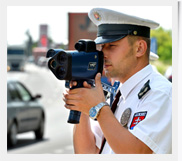Crossing the state border and conditions of entry
Rules for crossing the border and conditions for the entry of third-country nationals to the territory of EU Member States are subject to the regulation of the European Parliament and of the Council (EC) No. 399/2016 of 9 March 2016 establishing the Community Code of the Union on the rules governing the movement of persons across borders (Schengen Borders Code), as amended.
External borders may only be crossed at border crossing points and during the fixed opening hours.
A section of the state border between the Slovak Republic and Ukraine has become the external land border of the European Union on 21.12.2007. The international airports with allowed operation of flights to third countries or flights from third countries (a third country, in this case, is a state which does not apply the EU law on the abolition of controls at internal borders) form the external air border.
Internal borders may be crossed at any point without border control of persons, irrespective of their nationality.
A section of the state border between the Slovak Republic and the Republic of Poland, the Czech Republic, Austria and Hungary has become the internal land border of the European Union on 21.12.2007.
Entry conditions for third-country nationals
For a planned stay in the territory of EU Member States, which shall not exceed 90 days in any 180-day period, which includes an assessment period of 180 days prior to each individual day of stay, third-country nationals shall meet the following conditions:
- They have a valid travel document or documents authorising them to cross the border and which satisfies the following criteria:
1. It must be valid for at least 3 months after such intended date of departure from the territory of the EU Member States. In duly substantiated emergency situation this condition may be waived;
2. It had to be issued during the last 10 years; - They are in possession of a valid visa, if required pursuant to the Council Regulation (EC) No. 539/2001 listing the third countries whose nationals must be in possession of visas when crossing the external borders of the Member States and those whose nationals are exempt from that requirement as amended, except to the extent that they hold a valid residence permit or a valid long-stay visa,
- They justify the purpose and conditions of the intended stay and they have sufficient means of subsistence for the duration of the intended stay and for the return to their country of origin or transit to a third country into which they are certain to be admitted, or are in a position to acquire such means lawfully,
- These are not persons with an issued alert by the SIS (Slovak Information Service) for the purpose of refusing entry,
- They are not considered to be a threat to public policy, internal security, public health or international relations of any of the EU Member States and in particular there was no alert issued against them for such a reason in any Member States' national data bases for the purpose of refusing entry.
Border control
It is a check made at border crossing points to ensure that persons, including their means of transport and the objects in their possession, can be authorised to enter the territory of an EU Member State or be authorised to leave it.
Persons benefiting from the right to free movement in accordance with European Union law are subject to systematic verification of identity and nationality when crossing any external borders, as well as the authenticity and validity of the travel document for crossing these borders, including looking into databases of lost and stolen documents as well as verifying that persons do not constitute a threat to public order and internal security.
Third-country nationals shall be subject to thorough checks on entry and exit
- Thorough checks on entry shall include verification of conditions governing entry and of documents authorising residence and the pursuit of a professional activity. This shall include a detailed examination covering the following aspects:
- Verification of the identity and nationality of the third-country national, as well as the authenticity and validity of the travel document for crossing of borders, including looking into relevant databases;
- Verification that the third-country national has a document valid for crossing the border that has not expired and that the required visa or residence permit is attached to the document, if necessary;
- Examination of the entry and exit stamps on the travel document of the third-country national in order to verify, by comparing the dates of entry and exit, whether the person has already exceeded the maximum duration of an authorised stay in the territory of the EU Member States;
- Verification of the point of departure and the destination of the third-country national and the purpose of the intended stay and, if necessary, review of relevant supporting documents;
- Verification that the third-country national has sufficient means of subsistence for the duration and purpose of the intended stay, for return to the country of origin or transit to a third country into which he/she is certain to be admitted, or whether he/she is in a position to acquire such means lawfully, verification that the third-country national and his/her means of transport and the objects that are being transported are not likely to threaten the public order, internal security, public health or the international relations of any of the EU Member States. Such verification shall include direct consultation of the data and alerts on persons and, where appropriate, information included in the SIS and in national data files and the action to be performed as a result of an alert.
Last Modify: 12. 2. 2021, 10:58

 Pribinova 2, 812 72 Bratislava
Pribinova 2, 812 72 Bratislava +421 2 5094 1111
+421 2 5094 1111 +421 2 5094 4397
+421 2 5094 4397

